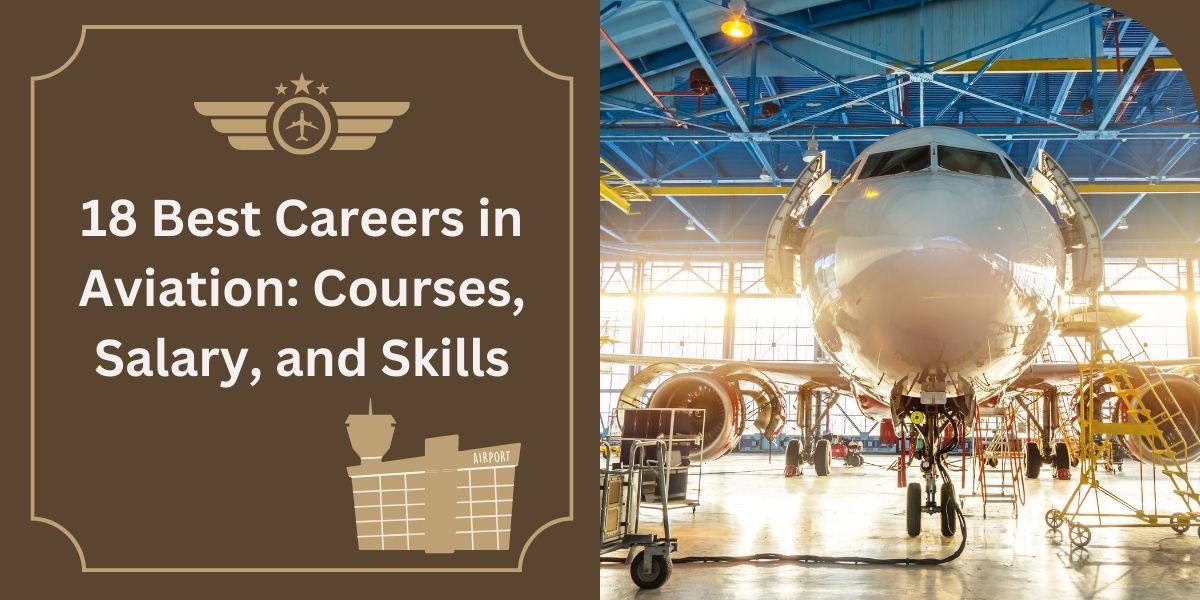The aviation industry is fast evolving and needs a list of qualified personnel for an array of aviation jobs. The aviation industry provides careers requiring various skills, interests, and backgrounds. Many entry-level aviation jobs include extensive customer service contact, requiring strong communication and interpersonal skills.
Some aviation careers require certification from the Federal Aviation Administration, such as pilot and air traffic control specialist. Some aviation careers, including aviation business management, may require a college degree.
If you’re considering embarking on a career in aviation in 2024, this comprehensive guide explores the 18 best jobs in aviation, providing invaluable insights into the salaries, skills, and a list of courses required to soar to new heights in this dynamic industry.
Is aviation a good career?
Simply put, the activities in the aviation industry revolve around designing and developing various aircraft, handling production and operations, and flying or repairing aircraft.
As an ever-growing industry, one can find innumerable opportunities across various sub-domains of the sector and avail a wide range of benefits and perks.
Whether you are planning to become a part of the cabin crew or aspiring to pursue commercial pilot courses, an aviation job is financially fulfilling and personally rewarding.
What skills are required for jobs in aviation?
Here is a list of some relevant skills required for jobs in the aviation industry.
- Pleasant and friendly personality
- Agility and a good sense of balance
- Good health and physical fitness
- Clear speech and voice
- Presence of mind
- Team worker
- Presence of mind
- Punctuality
- Patience
- Politeness
18 of the Best Jobs in Aviation
There are a wide variety of jobs available in the aviation industry. Here is a list of jobs in the aviation industry that you can consider. We have also included their average salaries and primary duties.
1. Aerospace engineer
Average salary: $102,364 per year
Primary duties: An aerospace engineer designs new aircraft and space vehicles.
Typical job duties include designing aircraft parts and equipment, creating detailed specifications for aircraft design, creating drawings of aircraft using CAD/CAM, ensuring that all parts and aircraft meet safety and regulatory requirements, conducting system tests, troubleshooting issues, and modifying problematic systems and designs.
2. Flight Instructor
Average salary: $95,174 per year
Primary duties: Flight instructors teach people how to fly airplanes, helicopters, and other aircraft. These instructors provide detailed instruction via on-the-ground classes, in simulators, or during live flights.
They may also examine students for proficiency and help them prepare for the pilot’s license test required by the Federal Aviation Administration.
3. Avionics engineer
Average salary: $94,593 per year
Primary duties: An avionics engineer researches and solves problems with aviation electronics. They may work on landing systems, communications equipment, safety instrumentation, navigation, and flight-control systems.
Their other job duties include conducting system inspections and testing and repairing faulty systems. They may also be responsible for calibrating the aircraft crew’s communications frequencies to communicate with other pilots and ground personnel in aviation jobs.
4. Flight test engineer
Average salary: $83,266 per year
Primary duties: A flight test engineer is responsible for testing the performance and operations of aircraft to ensure that they comply with all Federal Aviation Administration guidelines and regulations.
However, they plan, coordinate, and conduct tests on all parts of an aircraft, troubleshoot issues, and prepare detailed testing documentation.
5. Aircraft mechanic
Average salary: $69,495 per year
Primary duties: Aircraft mechanics must inspect, maintain, and repair aircraft according to Federal Aviation Administration guidelines.
Typical job duties also include repairing sheet metal, inspecting the plane tail and wings for damage or corrosion, replacing or repairing broken parts, maintaining engines, and working with detailed aircraft blueprints.
6. Aviation manager
Average salary: $62,863 per year
Primary duties: In aviation jobs, an aviation manager is responsible for all day-to-day operations in an airport or airline.
They maintain airplane maintenance records, monitor inspection schedules, ensure their employer complies with all Federal Aviation Administration regulations, and work with emergency responders and prep flight crews. They also manage the staff and create work schedules.
7. Aircraft maintenance technician
Average salary: $48,866 per year
Primary duties: Aircraft maintenance technicians repair and perform maintenance on airplanes, helicopters, and other aircraft.
Typical job duties include inspecting aircraft parts for defects, diagnosing mechanical issues, measuring critical parts for wear, repairing or replacing broken parts, and keeping detailed records of all work done on an aircraft.
8. Air traffic controller
Average salary: $46,114 per year
Primary duties: An air traffic controller monitors the air traffic within a particular air space. They also instruct pilots on landing and takeoff procedures, analyze weather forecasts, and determine air routes for pilots.
Additional duties include organizing searches for missing airplanes, controlling airport lighting, and monitoring all communications in and out of the flight tower.
9. Pilot
Average salary: $43,950 per year
Primary duties: Pilots are responsible for flying and navigating helicopters, airplanes, and other kinds of aircraft. They may transport passengers and cargo, dust crops, operate sightseeing tours, and assist in rescue and firefighting operations.
Pilots must perform pre- and post-flight inspections, keep accurate flight records, communicate with air agencies and tower personnel, and ensure the safety of all passengers and crew on board.
10. Cargo agent
Average salary: $42,884 per year
Primary duties: In aviation jobs, a cargo agent is responsible for moving goods through the airline.
They must ensure that packages are delivered and picked up in a timely fashion, complete all necessary paperwork, and collect delivery fees. International cargo agents must also complete and inspect all customs and tariff paperwork.
11. Aircraft cleaner
Average salary: $27,131 per year
Primary duties: Aircraft cleaners are responsible for cleaning the inside of a plane. Typical job duties include the preparation of cleaning products, waste removal, spot-cleaning problem areas, sanitizing bathrooms, vacuuming the carpet, and restocking supplies.
12. Line service technician
Average salary: $30,337 per year
Primary duties: A line service technician is responsible for supporting flight crews and passengers on all inbound and outbound flights.
Duties include loading and unloading passenger baggage, towing and marshaling the aircraft, fueling the plane, providing basic security, and assisting pilots during pre- and post-flight services. These technicians also operate ground equipment and ensure that aircraft are choked, locked, and secure.
13. Reservation agent
Average salary: $31,271 per year
Primary duties: A reservation agent provides information to customers of an airline. They answer questions on ticket pricing, meals, seat availability, car rentals, airline regulations, and layovers. A reservation agent also books flights, accepts payments, and resolves customer issues.
14. Baggage handler
Average salary: $31,291 per year
Primary duties: A baggage handler loads and unloads luggage and other cargo on an airplane.
They move baggage using tugs, tow tractors, and conveyor belts. In aviation jobs, these professionals also use their baggage handling skills to protect baggage from theft and alert security to any suspicious-looking or unusual items.
15. Aircraft fueler
Average salary: $35,117 per year
Primary duties: An aircraft fueler is responsible for fueling and maintaining aircraft. Job duties include safely connecting and disconnecting fueling equipment, filling fuel tanks on wings, filling out paperwork, and inspecting equipment for issues.
16. Avionics technician
Average salary: $35,973 per year
Primary duties: An avionics technician maintains all of the electronics and wiring on an aircraft.
Typical job duties include running cables, connecting navigation instruments, mounting antennas, and installing radios and flight entertainment systems. Additional tasks include troubleshooting equipment issues and repairing broken devices.
17. Flight attendant
Average salary: $36,219 per year
Primary duties: Flight attendants ensure the safety and comfort of all airline passengers in their aviation jobs. They are responsible for conducting preflight briefings with pilots, performing preflight inspections of all emergency equipment, instructing passengers in emergency procedures, and administering emergency medical care.
They also serve in-flight meals, reassure anxious passengers, and care for passengers with support needs.
18. Flight paramedic
Average salary: $38,018 per year
Primary duties: A flight paramedic is responsible for all aspects of care for patients being transported by aircraft. Typical duties include assessing injuries, prioritizing medical needs, and providing advanced life support to critically ill patients.
These professionals also organize and restock the aircraft with needed medical supplies after every flight.
Aviation Jobs: Courses and Subjects
Below is a list of some of the prominent courses and the most common subjects related to the aviation industry that will help aspirants build their own careers and jobs in this sector:
Courses in aviation
- Diploma in Aviation—Aircraft Structure
- Diploma in Aviation—Aircraft Maintenance
- Diploma in Aviation—Avionics Maintenance
- Bachelors of Aviation Management
- Bachelor of Science in Aviation Logistics
- BEng Aerospace Engineering with Pilot Studies
- BEng Aerospace Engineering with Pilot Studies (Hons)
- Bachelor of Aviation
- BSc Aviation, Airline and Airport Management
- Associate in Science in Aviation
- Graduate Certificate in Aviation Management
- MSc Aviation Management in the Digital Age
- Master of Aviation Management
- MSc International Tourism and Aviation Management
Subjects in aviation
- Entrepreneurship Development
- Airline Advertising and Sales promotion
- Aviation Law
- Strategic Management
- Airline Economics
- Supply Chain Management
- E-Business
- Aircraft Maintenance Management
- Cross-Cultural Management
- Total Quality Management
- Air Law
- General Navigation
- Aircraft General Knowledge
- Meteorology
- Radio Navigation
- Principles of Flight
- Human Performance and Limitations
- Mass and Balance
Conclusion
As the aviation sector continues to evolve, staying informed and adaptable is key to thriving in this competitive field.
Whether one aspires to become a pilot, aerospace engineer, or air traffic controller, the knowledge gained from this guide, “18 Best Careers in Aviation: Courses, Salary, and Skills,” will equip individuals with the necessary information to make informed decisions in their list of career paths and jobs in the industry.







